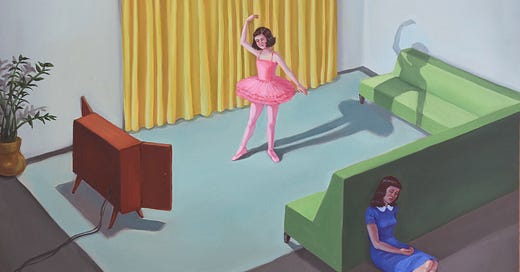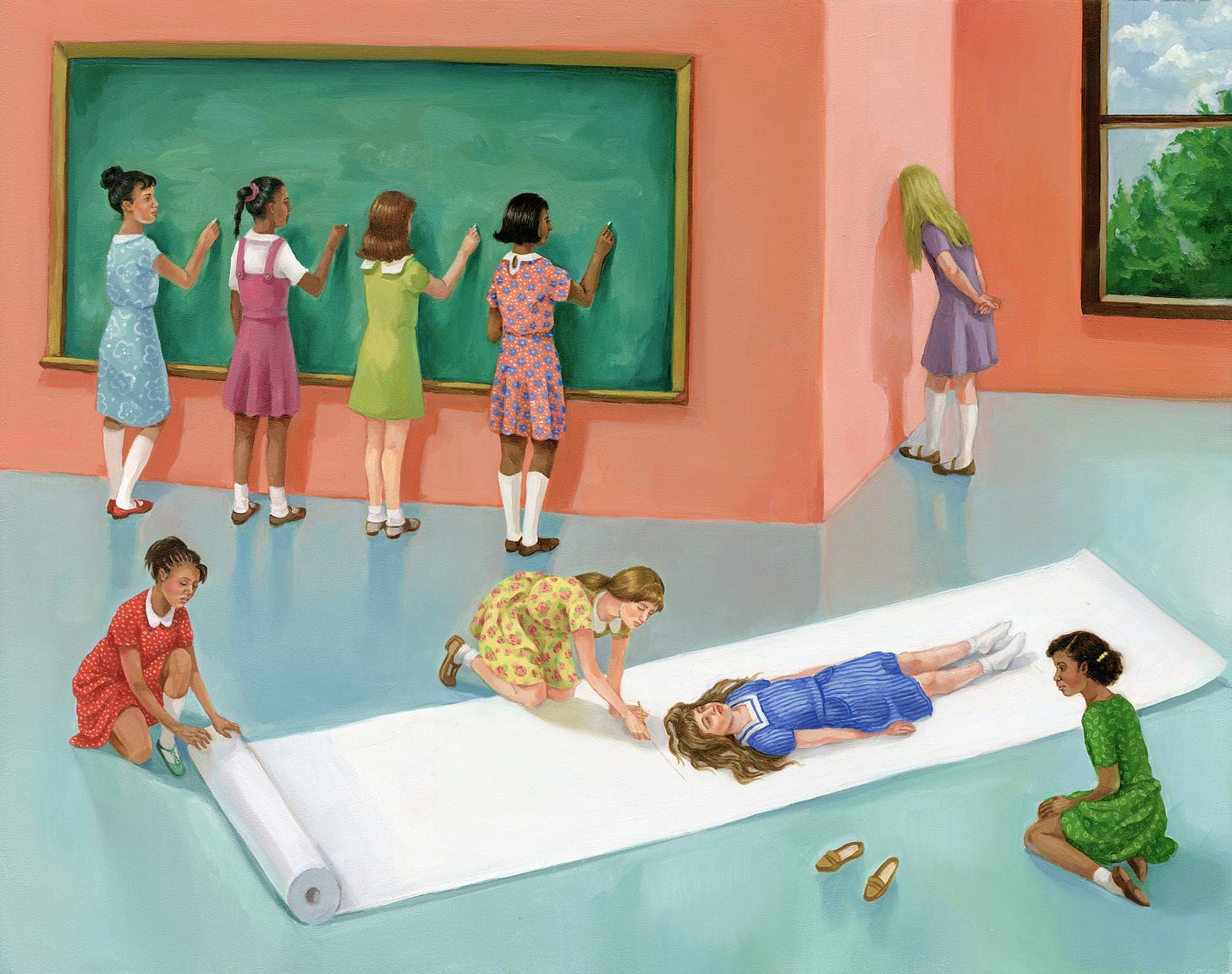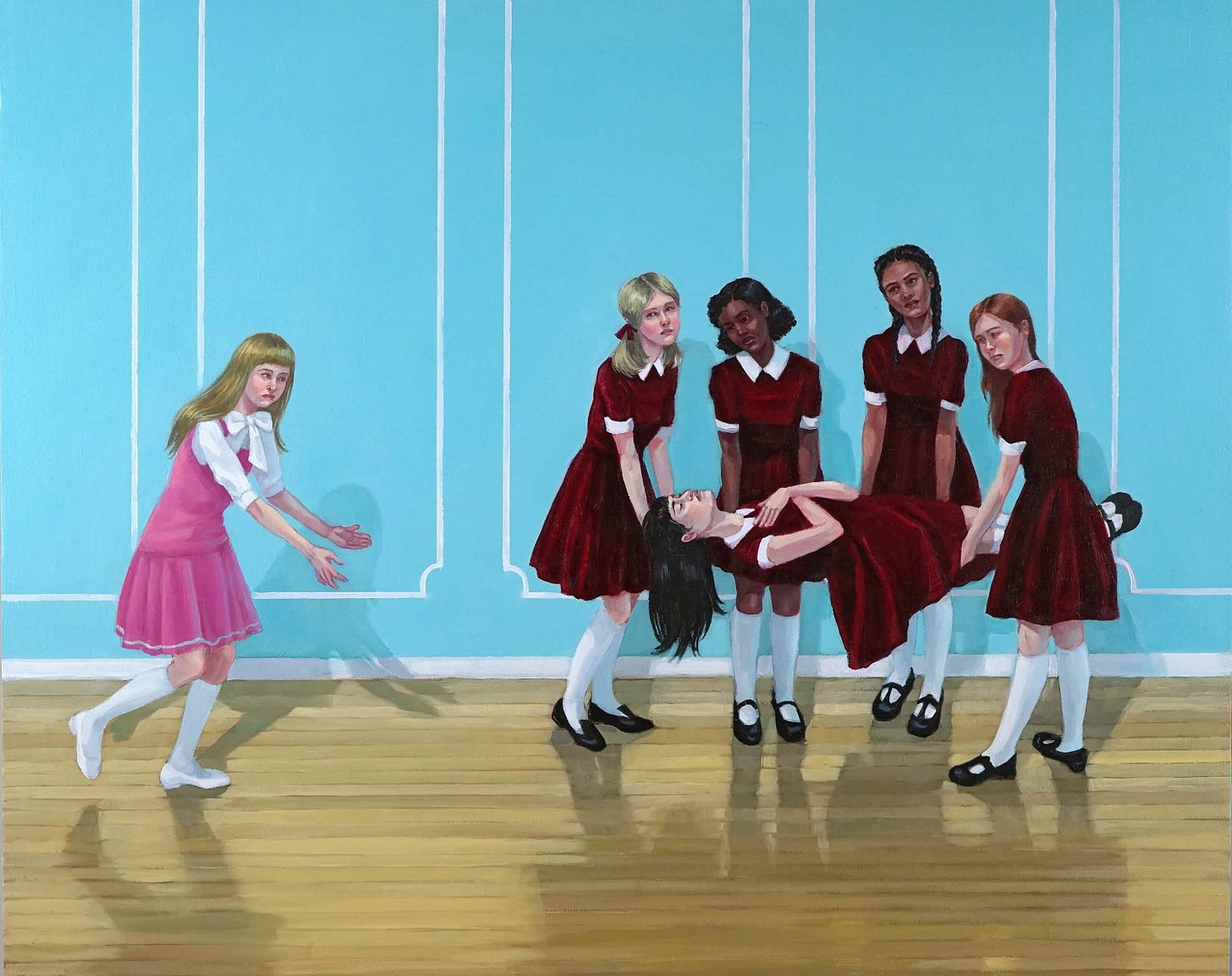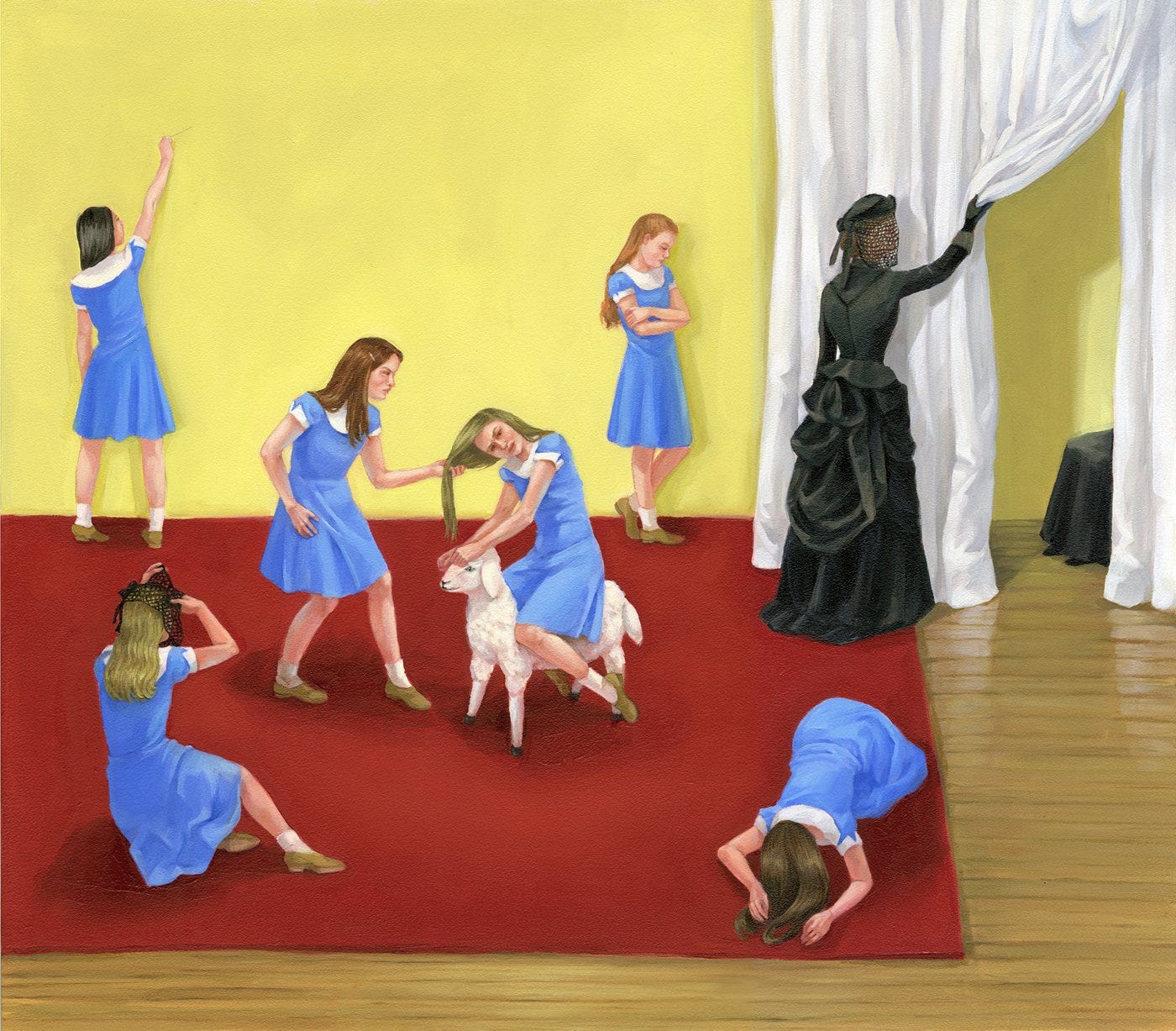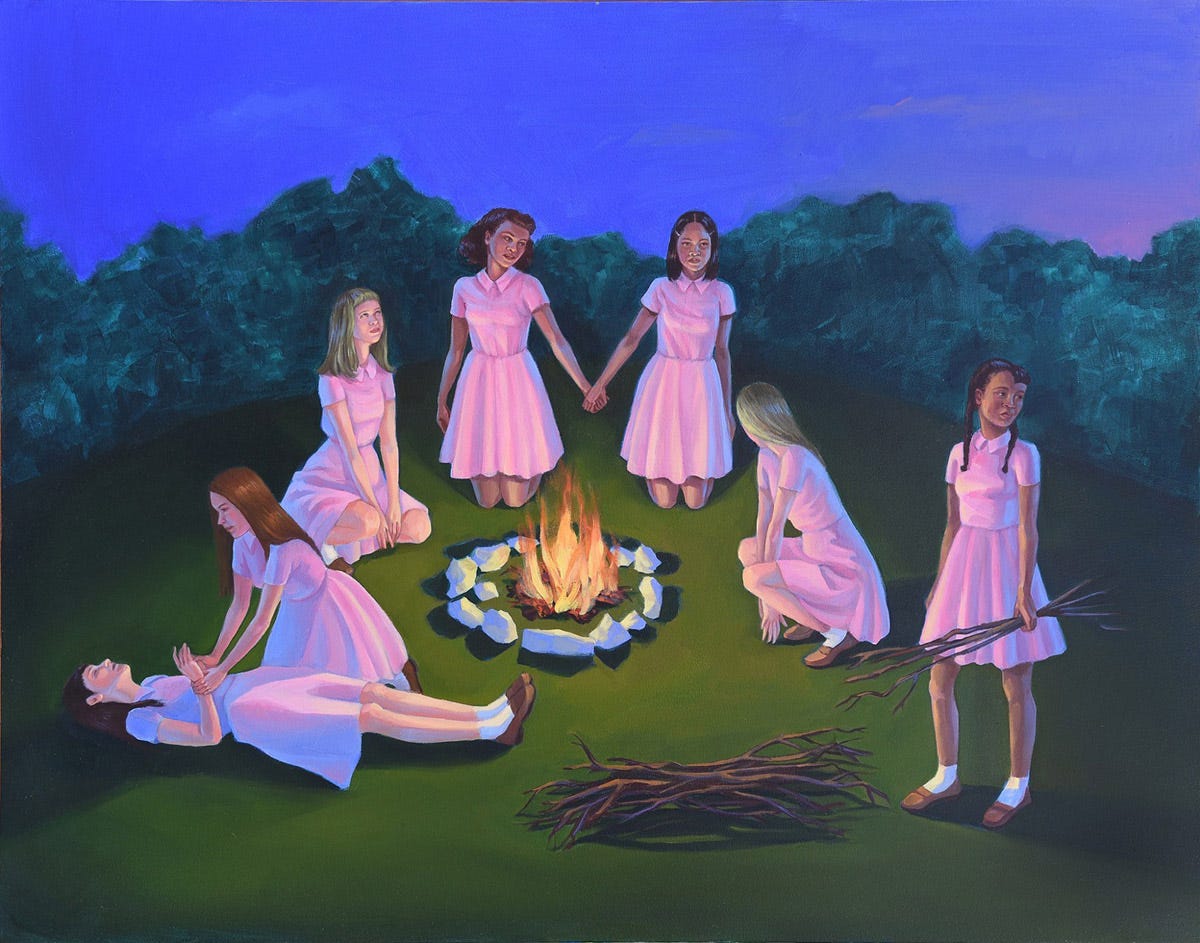"over the mysteries of female life, there is drawn a veil best left undisturbed"
vignettes on femininity, womanhood
I thought, not for the first time, that vanity is so great a blessing to women that it should be listed among the major virtues.
— Ursula Parrott, Ex-Wife
one. unhappy birthday
Something weird happened to me when I turned twenty-nine in October of 2024, and based on the many conversations I’ve had with others since then, it seems to be the case that something weird happens to a lot of people when they turn twenty-nine.1
I won’t go into much detail, but basically, one day I was okay with my life, and the next day I believed it needed a complete overhaul.2 Suddenly, I was dissatisfied with every aspect of it: my job, living in NYC, my past, my future, my daily habits, my abandoned passions, everything. I knew that I could not continue to live the way I had been up until then; I felt that the consequences of doing so would be catastrophic.3
My thoughts and emotions during this time were intense and demanded immediate action—all except for one. It was quieter and more patient, despite being neglected for so long, and I found it much more interesting than the others, despite being the least consequential: it was my desire to be more feminine.
two. a hint of femininity
In 2020, I officially quit my six-year stint on birth control in an attempt to delineate between the real me4 and, I guess, the me that was manipulated into existence by a cocktail of synthetic hormones. In the years since then, I noticed myself slowly rediscovering the feminine habits and interests I used to have before birth control—mostly things like shopping, caring about my hair and outfits, buying more shoes, decorating my home, etc.
The shift was jarring, to say the least. While on birth control, I felt intense resistance to every aspect of femininity—physical, biological, societal—as though embodying it would somehow diminish my personhood. This means I spent some of the most formative years of my young adulthood rejecting an aspect of myself that once felt as natural as breathing. When you’re more than half a decade removed from being in touch with your femininity—and you exist in a culture where a year feels like ten years, and change happens so quickly that time feels like a big blur—how do you transition back seamlessly?
I only started to feel more comfortable embracing femininity recently. But my biggest struggle is that the more I think about femininity, the more I realize I don’t actually know what it is or why I yearn for it so much.
three. femininity, terribly defined
When I think about femininity, my mind turns to superficial characteristics first: hair that is colored and styled to perfection, a face that is enhanced by makeup, a body that is adorned with fine jewelry, a closet that is carefully curated to reflect one’s Pinterest-informed style, a dresser overflowing with creams and serums and other beautifying potions, a signature scent envied by others, a voice that is soft and warm, nails that are always manicured, and feet that painfully display fashionable shoes.
My mind then shifts to what might be considered feminine behaviors, cycling through the slop I often find on social media:
Daily affirmations for your divine feminine: I am stepping into an abundant glow-up. The universe loves to provide for me.
Link in my bio to see how I activated my feminine energy to make men worship me like a goddess and give me the princess treatment.
Life is a mountain, and men are born at the bottom because their life journey is about the climb—doing, achieving, strategizing. They earn their worth through the work they put in to climb the mountain. That’s why masculine energy is about doing. Women are born at the top of the mountain because they have inherent value. Their life journey is not about climbing the mountain, it’s about remembering how worthy they already are, and trust-falling off the side of the mountain knowing the masculine will catch them. Feminine energy is about surrendering; letting go and trusting. Now, go to ChatGPT and type in the following prompt: “Act like my manifestation coach and help me identify exactly where I’m stuck in unhealthy masculine energy. Based on my responses, give me a personalized plan to help me shift into a more feminine, passenger princess energy.”5
I also think of behaviors that are not necessarily feminine but are associated more with the female sphere, such as cleaning, cooking, dancing, hosting, consumerism, gossiping, cattiness, and so on.
Depending on her culture, a girl or woman may be celebrated for any of these characteristics and behaviors—or she may be forced into or punished for them. She may be expected to embody them (e.g., being beautiful) but demonized for how she does it (e.g., undergoing cosmetic procedures). In one decade, feminine beauty might mean being skinny with thin eyebrows and straight hair, while in the next, it means having an hourglass figure with thick, laminated eyebrows and voluminous hair. For one generation, it might be desirable to be an independent working woman who defies female stereotypes, while for the next, it means embodying more traditional feminine values. Forgive me for the cringe America-Ferrera-from-Barbie-eque speech, but yes, the constant flip-flopping of impossible expectations is tiresome.
Femininity is also rife with complexities and contradictions that make it hard to embody authentically. For example, our hormones inform a good bit of our behaviors and preferences, but so do the societies in which we live—so there is often a felt tension between natural femininity and performed femininity. Adding to the confusion: in much of media, femininity can represent both vulnerability (e.g., physically, compared to men) and strength (e.g., physically, for pregnancy and birth).
And all of this is why I don’t really know what femininity means, despite being bombarded with definitions from everyone, regardless of their sex, gender, or age.
four. femininity, ever-changing
There’s something strange about being a woman, perhaps even stranger than being a human. Right? Or maybe it only feels that way because femininity has been relentlessly commodified and womanhood unapologetically bastardized—by both sides of the ideological spectrum—which has left me with a whole mess to figure out for myself. I suspect many of my female peers feel similarly and, given our increasingly atomized society, are stuck trying to (re)define womanhood and femininity on their own. (From psychoanalyst Clarissa Pinkola Estés in her book Women Who Run With The Wolves: “We have seen the feminine instinctive nature looted, driven back, and overbuilt.”6 Indeed, we have.)
Has it always been this confusing? In part, this lack of clarity is due to ever-changing attitudes toward women and their roles in society, so the bigger question about femininity is, in fact, about womanhood. Ursula Parrott’s novel Ex-Wife was published in 1929, but many of the challenges it raises about what it means to be a woman—or what a woman is allowed to be, or forced to be, according to the norms of her society—are eerily reminiscent of our own time.
In the novel, Patricia is only twenty-four years old but already on the cusp of divorce (driven by her and her husband’s infidelities) and forced to navigate a society that is itself reckoning with the unintended consequences of abandoning the sexual puritanism of its predecessor. Her friend Lucia is already a divorcée, helping guide Patricia through this new phase of her life and offering advice like, “If you can really adopt the alleged masculine attitude toward sex, you’ve got all of New York to console you . . . I’m betting you can’t though. Not many women can.” And: “Every attractive woman has fifteen gold pieces to spend, one for each year between the time she is twenty and the time she is thirty-five. She may squander the first ten or twelve if she likes, but she damn well should invest the rest of them in something safe for her middle age.”
Lucia laments the consequences of a sexual liberation she never asked for and never benefitted from. (“Victim of the new freedom—had it thrust on me willy-nilly.”) Rather than being free, women must now “pay our own rent, and buy our own clothes, and put up with the eccentricities of three to eight men who have authority over us in business, instead of having to please just one husband.” She goes on:
“The principal thing that relieving women from the dullness of domesticity did, was to relieve men from any necessity of offering stability in return for love, fidelity and so on. Women used to have status, a relative security. Now they have the status of any prostitute, success while their looks hold out. If the next generation of women have any sense, they’ll dynamite the statue of Susan B. Anthony, and start a crusade for the revival of chivalry.7
The choices for women used to be: marriage, the convent, or the street. They’re just the same now. Marriage has the same name. Or you can have a career, letting it absorb all emotional energy (like the convent). Or you can have an imitation masculine attitude toward sex, and a succession of meaningless affairs, promiscuity, (the street, that is) taking your pay in orchids and dinner-dates instead of money left on the dresser.”
Patricia and Lucia struggle to make sense of the rapidly changing gender norms of their time (“obscenity in common speech is just another one-time strictly masculine ceremonial vice, like drinking and smoking, that recently gone bi-sexual”)—much like we struggle today with the mixed messages we receive about what it means to be a woman and embody femininity.
In her foreword to Ex-Wife, Alissa Bennett describes women’s fraught position in society at the time:
Lurching toward sexual revolution but still psychologically tethered to Victorian morality, women of Parrott’s generation found themselves caught in the freefall of collapsing convention. The seedy emotional texture of Ex-Wife’s Jazz Age debauchery reflected the panic felt by women across the country who had glimpsed freedom but remained ill-equipped to navigate its consequences.
. . . was Ex-Wife a confession, a fantasy, or a culture shifting too rapidly to acknowledge the inevitable casualties we leave in the wake of change?
And casualties there were—and continue to be. We are more than half a century into the sexual revolution, arguably living its end days, and in many ways still grappling with the breakdown of gender relations, false promises of sex positivity, and nostalgia for tradition in hopes of gaining some semblance of stability. We, too, feel panic; we, too, are ill-equipped to navigate the consequences of such change. And, our change is not just in one direction, but in many directions, each one promising that its picture of womanhood will be the one to finally offer you peace, happiness, and fulfillment.
In her book Girls & Sex: Navigating the Complicated New Landscape, Peggy Orenstein notes another shift in our understanding of womanhood:
Girls did not always organize their thinking about themselves around the physical. Before World War I, self-improvement meant being less self-involved, less vain: helping others, focusing on schoolwork, becoming better read, and cultivating empathy. Author Joan Jacobs Brumberg highlighted this change in her book The Body Project by comparing the New Year’s resolutions of girls at the end of the nineteenth and twentieth centuries:
“Resolved,” wrote a girl in 1892, “to think before speaking. To work seriously. To be self-restrained in conversations and actions. Not to let my thoughts wander. To be dignified. Interest myself more in others.”
And one hundred years later: “I will try to make myself better in any way I possibly can. . . . I will lose weight, get new lenses, already got new haircut, good makeup, new clothes and accessories.”
Can you blame a woman for being so lost in the noise, never having a moment to breathe before the next change is thrown upon her, demanding acquiescence or death of social standing?
five. femininity, a requisite to greatness
Confusion about definitions aside, I’m not entirely sure why my desire for femininity is so strong in the first place. Perhaps it’s because, for much of my life, I have aspired to be a great person, which I defined as being a great woman. Because of my more conservative and traditional upbringing, this essentially meant preparing myself to be a good wife and mother. So, naturally I placed a lot of value on skills and behaviors such as cleaning (I don’t regret this one), modesty (that comes and goes), cooking (I’m getting better at this), being around kids (I’m a natural), and being soft-spoken and ladylike (I have failed every attempt in my life to embody these last two traits).
I never could have anticipated that the life I envisioned and tirelessly prepped for would be so different from the life I’m living today. In many ways, I’m glad my vision was not brought to fruition. I now understand that no part of me was ready to become a wife or mother when I thought I was. This is one of the successes of the sexual revolution that Ursula Parrott did not live long enough to see: while the death of rigid womanhood took with it comfort and stability, it birthed in its place a womanhood that is more flexible, forgiving, patient, and open to self-determination.
I’m open to the idea that femininity and womanhood not only evolve with the times but also throughout a woman’s life. I will have to define and redefine what they mean to me in each stage of my life, discerning the useful from the useless in the culture that is dominant at the time.8
There are many mysteries of female life, it’s true, but the veil need not be undisturbed—perhaps it’s the task of a great woman to take a peek and ask questions. (Before my twenty-ninth birthday crisis, I was not asking questions or exploring what felt authentic to me!) In Women Who Run With The Wolves, Estés reminds us: “Asking the proper question is the central action of transformation. The key question causes germination of consciousness. The properly shaped question always emanates from an essential curiosity about what stands behind. Questions are the keys that cause the secret doors of the psyche to swing open.”
Give or take a couple of years. I have since learned that this is what people in the astrology community call a Saturn return, i.e., the time it takes for Saturn to return to the position it was in when you were born, which is roughly every thirty years. Saturn returns tend to be tumultuous times in one’s life, forcing change, growth, and transition. Hmmm. Interesting! I’m still not convinced on astrology, but I’ll admit, they got my ass on this one.
Of course, it’s not true that everything was fine one day and not the next. In reality, my dissatisfaction had been slowly surfacing for a couple of years by then, but I was avoiding it (until, of course, that was no longer an option).
Sorry for being dramatic. It felt very dramatic at the time.
I’ve written before about how, more often than not, attempts to discover one’s real self are haphazard and ultimately futile. I will say, though, that you actually will find a different version of yourself off birth control (for better or worse). For me, the off-birth-control-self feels more authentic than the on-birth-control-self, which… was a whole mess. My God.
Yes, this is real. In the few months since this video was published, it has gathered 2.5 million views, 340k likes, and 97k saves.
In my quest to reconnect with my femininity, I did what so many women before me have done and picked up a copy of Women Who Run With The Wolves, which defines healthy women as “[having] keen sensing, playful spirit, and a heightened capacity for devotion . . . relational by nature, inquiring, [possessing] great endurance and strength . . . deeply intuitive, intensely concerned with their young, their mates, and their pack . . . experienced in adapting to constantly changing circumstances; they are stalwart and very brave.” Much of the book is about a woman’s intuition, another thing I have lost touch with during my time on birth control.
The chivalry, in this case, is that men would be discreet about their episodes of infidelity to avoid social ostracization. According to Lucia, and I suspect many at the time, a marriage is not necessarily in trouble if a man goes on an occasional excursion trip (“he comes back, then, to the woman, no worse off, sometimes improved even”). The problem is when he starts taking world cruises, which is what the sexual liberation of her time is incentivizing.
I really enjoyed this post about defining femininity post-fertility:

